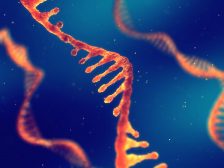Definition
noun
A double stranded DNA produced from the messenger RNA synthesis in a reaction catalyzed by an enzymes reverse transcriptase.
Supplement
Complementary DNA is usually used to cloned eukaryotic genes in prokaryotes to express specific proteins and is naturally produced by retrovirus like HIV-1 which able to incorporate to the host genome where it creates a provirus.
Complementary DNA is created as a result of intron-free mRNA that is why it is referred to as complementary copy of the mRNA because intron is not a coding sequence only exons codes DNA during transcription of the proteins where all intron RNA cut from primary RNA and the remaining piece is sliced back to become mRNA in which this cDNA is synthesized and formed.
Complementary DNA is basically useful in bioinformatics where it refer to an mRNA transcript sequence expressed as DNA bases relative to RNA bases. It is often used in gene cloning since when a gene transfer into another to express new genetic material as protein in a particular cell this cDNA will be added to that particular cell rather than the entire gene because some of DNA in the whole gene interrupts the coding sequence of the protein thus cDNA regularly obtained as expressed sequence tags.
Acronym: cDNA
See also:
• DNA sequence
• DNA microarray
• Cloning
• RNA
Dictionary > Complementary DNA




